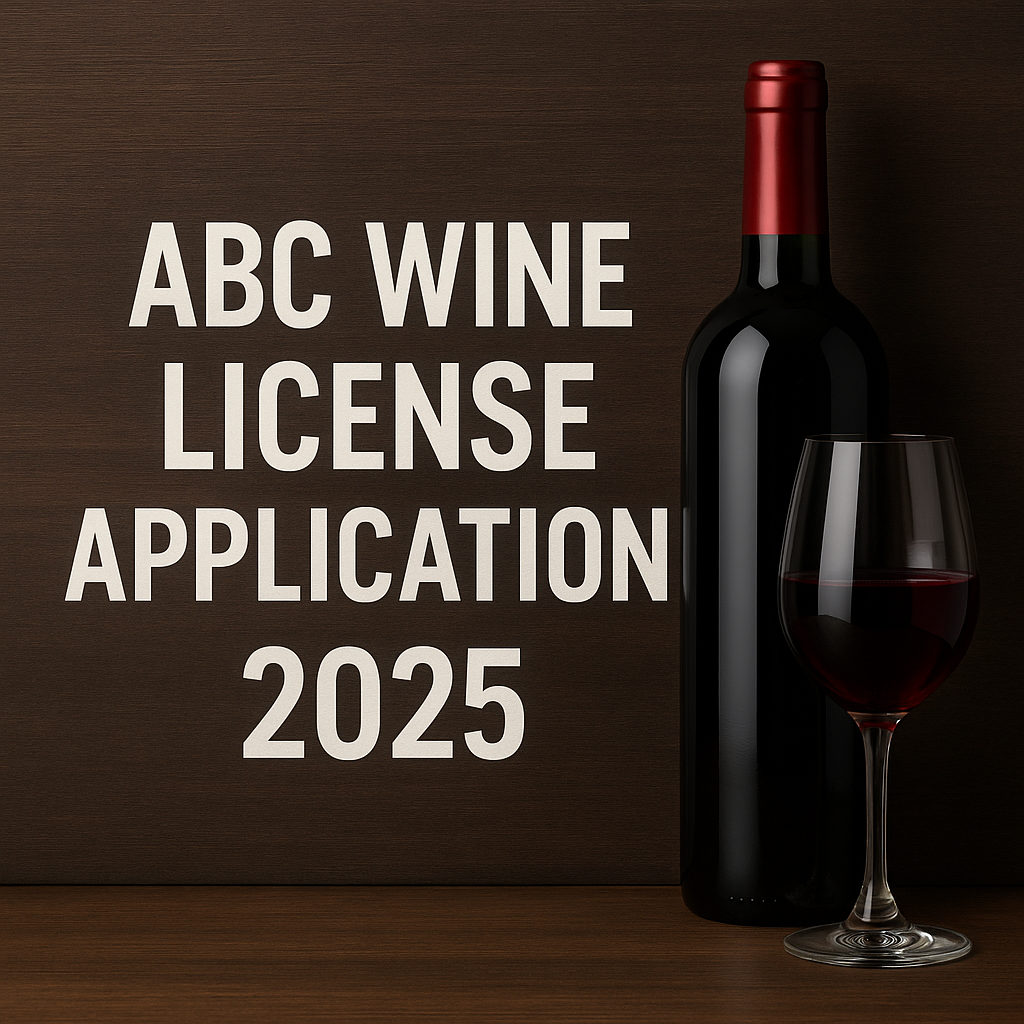Introduction
If you’re planning to sell or serve wine in California, you must obtain a license from the California Department of Alcoholic Beverage Control (ABC). The ABC wine license application process might seem complicated, but this detailed guide will help you understand each step, requirement, and fee involved.
Whether you’re starting a new wine bar, opening a restaurant, launching a winery, or running an e-commerce wine shop, this article will provide everything you need to know for a smooth ABC wine license application in 2025.
What is an ABC Wine License?
An ABC wine license is a permit issued by the California Alcoholic Beverage Control (ABC) that legally allows individuals or businesses to manufacture, distribute, sell, or serve wine in the state.
There are multiple wine license types, and choosing the right one is essential depending on your business model.
Types of Wine Licenses in California
Here are the most relevant ABC wine license types:
| License Type | Description | Annual Fee (Approx.) |
|---|---|---|
| Type 20 | Off-Sale Beer & Wine (e.g., grocery/liquor stores) | $400–$1,200 |
| Type 21 | Off-Sale General (beer, wine & spirits) | $900–$1,200 |
| Type 41 | On-Sale Beer & Wine – Eating Place (restaurants) | $400–$500 |
| Type 47 | On-Sale General – Eating Place (restaurants with spirits) | $1,000–$2,000 |
| Type 02 | Winegrower License (wineries, producers) | $100–$400 |
| Type 17 & 20 | Wine Wholesale + Retail (combo for small producers) | Varies |
Each license serves a specific business purpose. Choosing the wrong one may delay or reject your application.
Step-by-Step: How to Apply for an ABC Wine License
Step 1: Determine the Right License Type
Start by identifying your business model:
- Are you serving wine in a restaurant? → Type 41 or Type 47
- Are you selling wine bottles in retail? → Type 20 or Type 21
- Are you producing your own wine? → Type 02 (Winegrower)
Visit the official ABC license list to compare options.
Step 2: Prepare Your Business Documents
To apply, you’ll need the following:
- Business name registration
- LLC/Corporation paperwork (if applicable)
- Lease or proof of premises
- Business license from your city/county
- Zoning clearance for alcohol sales
- Seller’s permit from the California Department of Tax and Fee Administration (CDTFA)
Step 3: Submit the ABC Wine License Application
Go to https://www.abc.ca.gov and follow the online application portal.
You’ll need:
- Completed ABC-211 form
- Fee payment
- Premises diagram
- Owner background information
Applications can be submitted online or in person at your nearest ABC district office.
Step 4: Background Check & Public Posting
ABC will conduct background checks on all owners. A 30-day public notice must be posted at your premises, allowing local residents to raise objections.
In cities like Los Angeles, San Francisco, or San Diego, neighborhood input can significantly influence approval.
Step 5: Inspections & Interviews
An ABC field investigator may visit your premises and conduct interviews. You must demonstrate:
- Proper control over wine storage/sales
- No criminal background related to alcohol
- Compliance with local zoning and health codes
Step 6: Local City/County Approval
Your application may also require approval from:
- City Council or Planning Department
- Local Police Department
- Health Department
If objections arise, you may be required to attend a public hearing.
Step 7: Final Approval & Issuance
If no protests or legal issues arise, your wine license may be issued within 60–90 days. However, in competitive areas like Los Angeles or Napa Valley, it could take longer.
Fees and Timeline for ABC Wine License
| Item | Cost (Approx.) |
|---|---|
| Application Filing Fee | $100–$500 |
| Annual License Fee | $400–$2,000 |
| Background Check | $13 per person |
| Public Notice Fee | $50 |
| Fingerprinting | $70–$100 |
| Legal/Consultant (Optional) | $1,000–$5,000 |
Timeline: Usually 60–90 days, but could extend to 4–6 months in complex cases.
Tips to Speed Up Your ABC Wine License Application
- ✅ Submit all documents together
- ✅ Avoid zoning conflicts before you sign a lease
- ✅ Hire a licensing consultant for complex cases
- ✅ Ensure background check clearance
- ✅ Engage with community leaders if you expect objections
- ✅ Prepare for inspection with proper wine handling and safety setup
- ✅ Stay compliant with ADA & Fire Safety Codes
Can You Transfer an ABC Wine License?
Yes, some license types can be transferred between owners or premises. For example:
- Type 20 and Type 41 can usually be transferred
- Type 02 (Winegrower) is not transferable
ABC requires a transfer application, and all buyers must pass background checks.
Online Wine Sales & Delivery: What License Do You Need?
To sell wine online and deliver in California, you need:
- Type 20 (for off-site retail)
- Type 85 (internet-based wine retailer)
- Wine shipping permits for other U.S. states (if shipping interstate)
Pro Tip: Partnering with fulfillment services like VinoShipper or WineDirect can simplify compliance and logistics.
Common Reasons for Application Rejection
- ❌ Incomplete paperwork
- ❌ Zoning issues
- ❌ Criminal background
- ❌ Nearby schools or churches
- ❌ Community protests
- ❌ Misuse of alcohol on premises
- ❌ Lack of business license or tax permit
Legal Support and Consultants
Navigating California’s ABC wine licensing system can be challenging. Many wine entrepreneurs hire licensing experts or attorneys to avoid delays.
Firms like:
- ABC Licensing Services
- California License Specialists
Conclusion
The ABC wine license application is a crucial step for any business that wants to operate legally in California’s booming wine industry. While the process may seem overwhelming at first, breaking it down into clear steps and preparing in advance can save you time, money, and stress.
Whether you’re launching a vineyard, opening a wine bar, or starting an online wine shop, getting the right wine license is your ticket to success in 2025.

